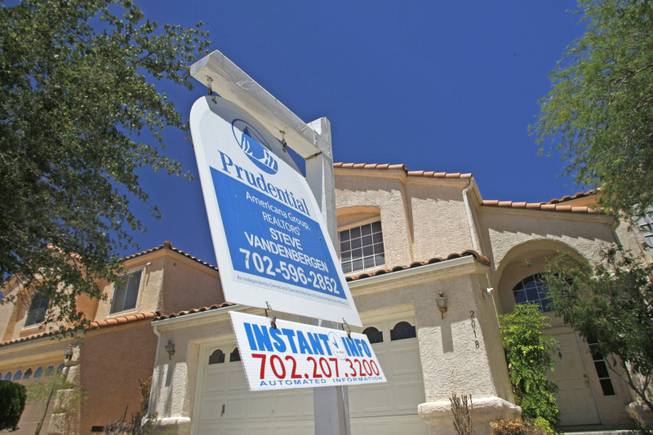Friday, July 17, 2009 | 3 a.m.
Sun Topics
Sun Coverage
Sun Archives
There’s a buzz in the Las Vegas Valley’s residential real estate business.
There’s excitement because Las Vegas set a record for existing-home sales in June, with prices holding steady for the first time in almost two years.
Some real estate pros hope the June housing numbers released last week by the Greater Las Vegas Association of Realtors are a sign that prospects for the housing market are improving, but analysts cautioned it’s too soon to say the market is recovering.
Experts say the major roadblock to recovery is the same obstacle that boosted inventories and pressured prices into a free fall: foreclosures.
First, the June numbers:
The Realtors report 4,702 single-family homes, town houses and condominiums sold in June, topping the previous record of 4,414 sales in June 2004.
The median price of homes sold in June held its own at $140,000 — the same as May.
That’s the first time there hasn’t been a median price drop since August 2007, when it rose 1.7 percent.
Prices have fallen 38 percent since June 2008 and 55 percent since the peak of $315,000 in June 2006.
“Everybody is asking if this is the bottom, but I don’t care if this is the bottom,” said Steve Bottfeld, executive vice president of Marketing Solutions. “The key question right now is how long are we going to stay on the bottom.”
Although the housing market is heading in the right direction based on June’s sales and prices, the big worry remains foreclosures, Bottfeld said.
A moratorium on foreclosures earlier this year slowed the amount of inventory hitting the market, but lenders are expected to begin offering a substantial number of newly foreclosed homes.
“Until we see those in the coming months, we won’t know when the market is coming back,” Bottfeld said.
Foreclosures dominated the market in June at 74 percent of the sales, according to the Realtors group.
First-time buyers taking advantage of the homes’ affordability and an $8,000 federal tax credit are gobbling up the inventory, and investors are active as well.
MDA DataQuick Information Systems estimate investors comprise 36 percent of the market.
Las Vegas housing analyst Dennis Smith, president of Home Builders Research, said he is not yet predicting the end of the downturn.
The market may have hit bottom in terms of the number of sales, but until prices stabilize and start to increase, no one can say a recovery is near, he said.
Smith said he wouldn’t be surprised if prices fall another $10,000 and level off for a while.
Once prices start rising, investors will leave the market, Smith said. The question will be whether there are enough other buyers to fill the void and sustain a recovery.
But until that happens, the wild card remains foreclosures, Smith said.
By some estimates, 20,000 to 25,000 foreclosed properties have yet to be put on the market and that could double if foreclosures increase as some expect.
“I think that supply is coming, and it is impossible to say if there is enough demand,” Smith said.
And the demand side is dicey: For the housing market to turn, there needs to be job growth. Right now, unemployment is rising and is above 11 percent, Smith said.
“Until people are confident they can stay in those houses and confident they are not going to lose their jobs, they are going to be reluctant to buy,” Smith said. “The best thing that could happen for the housing market is an improved job market. Then there won’t be sales just to investors.”
Las Vegas housing analyst Richard Lee, first vice president at First American Title, said the record number of sales has captured a lot of attention in the real estate community.
That’s the good news, but the bad news is that the foreclosed properties are the ones being sold. That’s what driving the market because most sales are lower-priced homes, especially those less than $150,000, Lee said. Prices stopped falling in June because there was enough demand to meet that price in the market, he said.
Lee said he wonders whether there will be enough buyers for many higher-priced homes — between $350,000 and $1 million — once the supply of lower-priced homes dwindles.
“I think a lot of people who can afford a $500,000 home don’t know quite yet what’s happening to the economy and are not comfortable buying in this situation,” Lee said.
Tim Sullivan, president of Sullivan Group Real Estate Advisors, said that, although the housing market is close to its bottom, what is different is this recovery will lag compared with past recoveries.
One reason is that real estate growth is driven by jobs, he said. In addition, during the 2001 recession, the housing market didn’t contract, and the market must pay a price for overdevelopment earlier this decade.
“We are paying double this time,” Sullivan said.



Join the Discussion:
Check this out for a full explanation of our conversion to the LiveFyre commenting system and instructions on how to sign up for an account.
Full comments policy